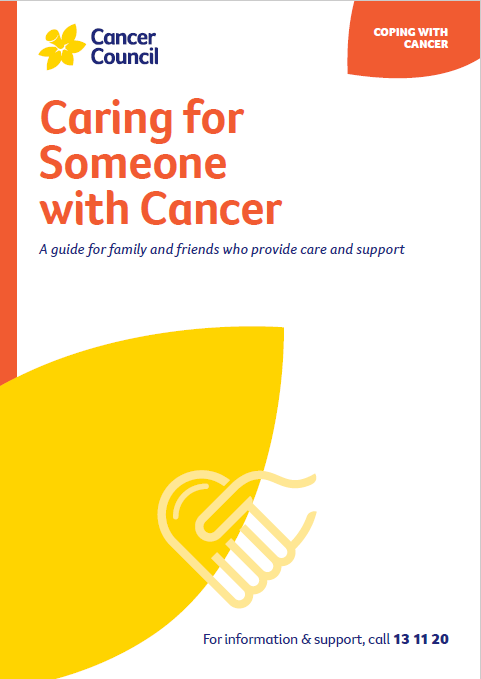- Home
- About Cancer
- Advanced cancer
- Facing end of life
- Caring for someone who is dying
- Providing emotional support
- When you don’t know what to say
When you don’t know what to say
People often wonder what they should say to a person who is dying. It is understandable that you might feel confused – what you feel might be so complex that it is hard to find the right words, or any words at all. It is natural to worry about saying the wrong thing. You may want to offer something that will help them cope but don’t know what that is. It is usually better to say something than to pretend nothing is wrong.
Most times, someone who is dying will find comfort in you being there, and appreciate knowing that family and friends are thinking of them. Even if you feel you’re not doing anything, just being there sends the message that you care.
In her book The Etiquette of Illness, Susan Halpern suggests asking, “Do you want to talk about how you’re feeling?” rather than “How are you feeling?” This approach is gentle and less intrusive. It also gives the person the choice to respond or to say no.
Ways to talk with someone who is dying
- Listen to what the person who is dying tells you. They may want to talk about dying, their fears or plans. Try not to prompt an answer that confirms what you think or your hope that things could be better.
- If you think they’d find it easier to talk to a spiritual care practitioner, offer to put them in touch with one.
- Try to treat someone who is dying as normally as possible and chat about what’s happening in your life. This makes it clear that they’re still a part of your life.
- Avoid talking in an overly optimistic way, for example, “You’ll be up in no time”. Such comments block the possibility of discussing how they’re really feeling – their anger, fears, faith etc.
- Apologise if you think you’ve said the wrong thing.
- Let them know if you feel uncomfortable. They might be feeling uncomfortable too. It’s okay to say you don’t know what to say.
- Accept that you or the person dying may cry or express anger. These are natural responses to a distressing situation.
- Ask questions. Depending on how comfortable you feel asking direct questions and on their willingness to talk, you could ask, “Are you frightened of dying?” or you may prefer, “I wonder whether there’s something you want to talk about?”
- Encourage them to talk about their life, if they’re able to and interested. Talking about memories can help affirm that their life mattered and that they’ll be remembered.
- Just be there. Sometimes it’s the companionship that is most appreciated – sit together and watch television or read.
- Even if they’ve shown no religious interest in the past, that could change as death approaches. You could offer to pray together, but respect their wishes if this is not something they want.
→ READ MORE: Making arrangements
Podcast: Living with Dying
Listen to more episodes of our podcast for people affected by cancer
More resources
Prof Jane Phillips, Head, School of Nursing and Professor, Centre for Healthcare Transformation, Queensland University of Technology and Emerita Professor Palliative Nursing, University of Technology Sydney, NSW; Prof Meera Agar, Palliative Care Physician, Professor of Palliative Medicine, University of Technology Sydney, IMPACCT, Sydney, NSW; Sandra Anderson, Consumer; A/Prof Megan Best, The University of Notre Dame Australia and The University of Sydney, NSW; Prof Lauren Breen, Psychologist and Discipline Lead, Psychology, Curtin University, WA; David Dawes, Manager, Spiritual Care Department, Peter MacCallum Cancer Centre, VIC; Rob Ferguson, Consumer; Gabrielle Gawne-Kelnar, Counsellor, Psychotherapist and Social Worker, One Life Counselling & Psychotherapy, NSW; Justine Hatton, Senior Social Worker, Southern Adelaide Palliative Services, Flinders Medical Centre, SA; Caitlin MacDonagh, Clinical Nurse Consultant, Palliative Care, Royal North Shore Hospital, Northern Sydney Local Health District, NSW; McCabe Centre for Law and Cancer; Palliative Care Australia; Belinda Reinhold, Acting Lead Palliative Care, Cancer Council QLD; Xanthe Sansome, National Program Director, Advance Care Planning Australia; Kirsty Trebilcock, 13 11 20 Consultant, Cancer Council SA.
View the Cancer Council NSW editorial policy.
View all publications or call 13 11 20 for free printed copies.
Need to talk?
Support services
Support for carers
Speak to a health professional or to someone who has been there, or find a support group or forum
Cancer Council Online Community
A community forum – a safe place to share stories, get tips and connect with people who understand
Cancer information
Advanced cancer
Information for all stages of advanced cancer, from the initial diagnosis to palliative care and grief
Information for carers
Information for family and friends providing care to someone at any stage of cancer

